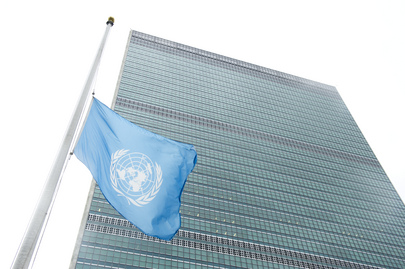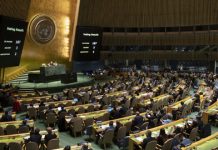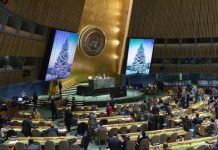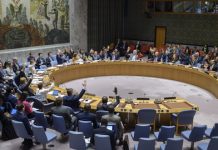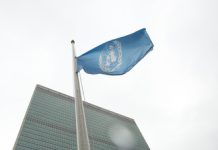Food security experts confirm famine in Gaza Governorate
More than half a million people in the Gaza Strip are trapped in famine, marked by widespread starvation, destitution and preventable deaths, UN-backed food security experts said on Friday.
Famine conditions are projected to spread from Gaza Governorate to Deir Al-Balah and Khan Younis Governorates in the coming weeks, according to the new Integrated Food Security Phase Classification (IPC) analysis.
By the end of September, more than 640,000 people will face ‘catastrophic’ levels of food insecurity – classified as IPC Phase 5 – across the enclave.
An additional 1.14 million people will be in phase 4 with a further 396,000 people facing phase 3 ‘crisis’ conditions. And conditions in North Gaza are estimated to be as severe or worse than in Gaza City.
Here’s the UN Emergency Relief Coordinator Tom Fletcher, speaking to journalists in Geneva.
“Be in no doubt that this is irrefutable testimony. It is a famine, the Gaza famine. It is a famine that we could have prevented if we had been allowed. Yet, food stacks up at borders because of systematic obstruction by Israel. It is a famine within a few 100 metres of food, in a fertile land.”
The UN continues to call for an immediate ceasefire so that aid can enter Gaza at scale, and for the immediate release of all hostages seized in the Hamas-led 7 October 2023 terror attacks on Israel.
Sudan: UN rights office horrified by recent killings in El Fasher
The UN human rights office, OHCHR, on Friday urged warring parties in Sudan to take concrete measures to protect civilians and to facilitate unimpeded humanitarian assistance for those in need.
The Sudanese army and a rival military known as the Rapid Support Forces (RSF) have been locked in battle for control of the country since April 2023.
OHCHR said recent brutal attacks by the RSF on the besieged city of El Fasher in North Darfur state and the adjoining Abu Shouk camp for displaced people resulted in the killing of at least 39 civilians, though the actual number could be higher.
These incidents occurred over a 10-day period ending on 20 August.
In the latest attacks documented by OHCHR, between 16 and 20 August, at least 32 civilians were killed. Furthermore, at least 57 civilians were killed in previous attacks on 11 August.
Spokesman Jeremy Laurence said the office was particularly horrified that 16 of the most recent killings appear to have been summary executions.
“Most of the victims were killed in Abu Shouk camp and belonged to the African Zaghawa tribe, according to information gathered by our Office. In another case in the El Fasher area, a victim was asked which tribe he belonged to. He was killed after responding that he was from the African Berti tribe.”
Meanwhile, the humanitarian situation in El Fasher has reached a critical stage after more than a year of siege, and there is growing risk of famine in the city and other areas of North Darfur.
OHCHR was appalled by two separate attacks on UN humanitarian convoys in North Darfur this month and in June, saying such attacks only worsen the human rights situation for civilians.
Ending impunity for violence critical for Rohingya in Myanmar
The UN human rights office has also called for ending impunity in the violence against the Rohingya people in Myanmar and ensuring their rights to security, citizenship and equality.
It said the Rohingya – a mostly Muslim minority community in predominantly Buddhist Myanmar – continue to suffer, eight years after a deadly crackdown by the military.
More than 700,000 fled to Bangladesh in the wake of the assault which began on 25 August 2017, joining others who had escaped earlier waves of attacks.
OHCHR said that ending impunity and ensuring the Rohingya’s rights to security, citizenship and equality are essential for breaking the cycle of violence.
The Rohingya mainly live in Myanmar’s Rakhine state, and the office noted that the human rights and humanitarian situation there have sharply deteriorated since November 2023, further deepening the already life-threatening conditions they face.
OHCHR urged the international community to step up support for the Rohingya by increasing humanitarian funding to secure access to basic needs and essential services, and to ensure accountability processes.
Dianne Penn, UN News.
Source of original article: United Nations (news.un.org). Photo credit: UN. The content of this article does not necessarily reflect the views or opinion of Global Diaspora News (www.globaldiasporanews.com).
To submit your press release: (https://www.globaldiasporanews.com/pr).
To advertise on Global Diaspora News: (www.globaldiasporanews.com/ads).
Sign up to Global Diaspora News newsletter (https://www.globaldiasporanews.com/newsletter/) to start receiving updates and opportunities directly in your email inbox for free.


